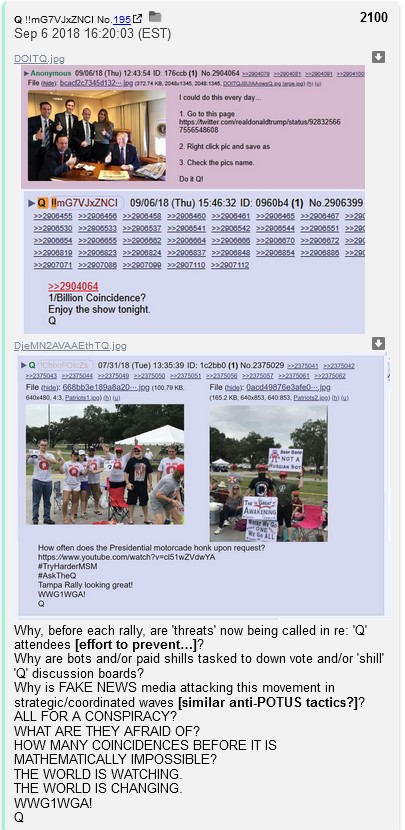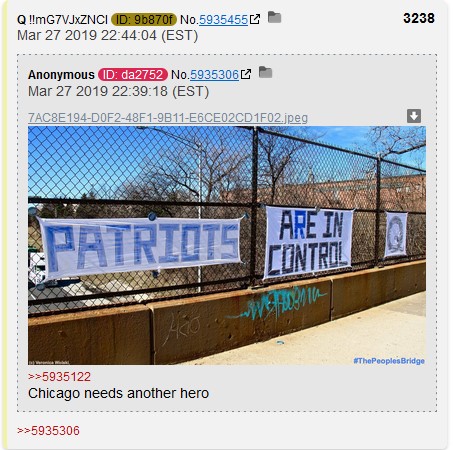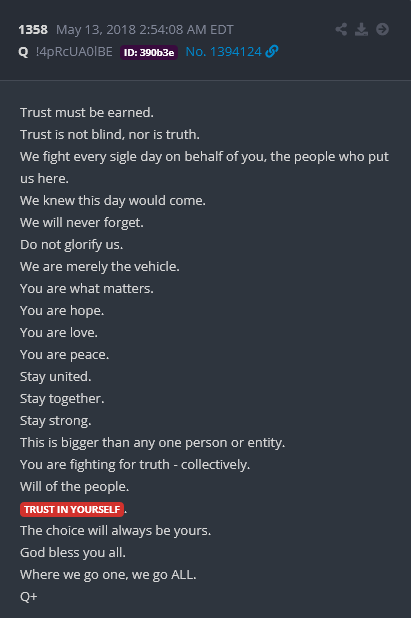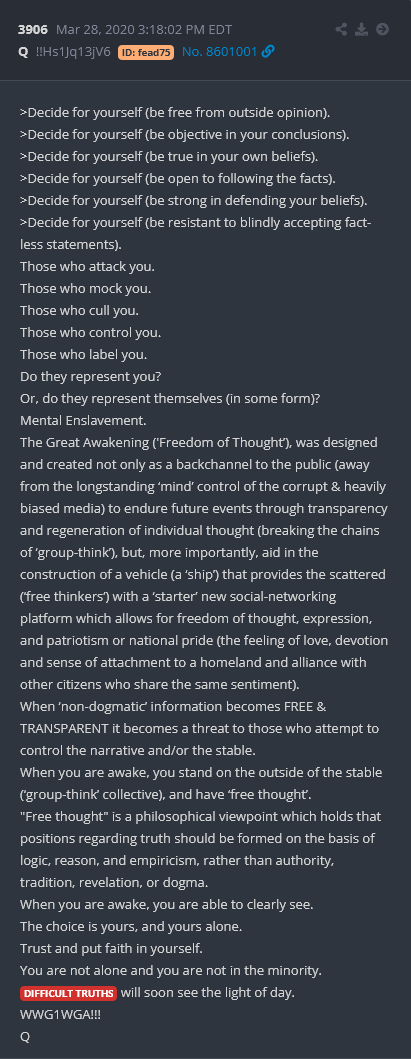It looks like you're using an Ad Blocker.
Please white-list or disable AboveTopSecret.com in your ad-blocking tool.
Thank you.
Some features of ATS will be disabled while you continue to use an ad-blocker.
share:
originally posted by: pteridine
a reply to: crankyoldman
The voice of Q video looks like a clip from Forbidden Planet.
That is 1982. I'll defer to MT on the timeline there, as I really do not recall it.
Forbidden Planet, very underrated.
Good to see you.
a reply to: OveRcuRrEnteD
Right, I didn't take that into consideration.
Qanon" is a worldwide phenomenon not just a US operation.
Right, I didn't take that into consideration.
Manhattan DA’s office must turn over documents related to former JPMorgan exec in bank lawsuit over Jeffrey Epstein connections
www.cnn.com...
JPMorgan CEO Jamie Dimon testifies he had no involvement with Jeffrey Epstein account, bank says
JPMorgan pushes back
www.cnbc.com...
A federal judge ruled Friday that the Manhattan District Attorney’s Office must turn over documents related to former JPMorgan Chase (JPM) executive James “Jes” Staley in response to a subpoena from the bank in ongoing federal lawsuits that allege JPMorgan enabled and benefited from longtime banking-client Jeffrey Epstein’s sex trafficking crimes.
An anonymous victim of Epstein has alleged in a lawsuit that “at least one of Epstein’s friends used aggressive force in his sexual assault of her and informed [her] that he had Epstein’s permission to do what he wanted to her.” JPMorgan, in a crossclaim against Jes Staley, has asserted that the “powerful financial executive” not named in her lawsuit is actually Staley. Staley has denied all wrongdoing alleged in the lawsuits.
The prosecutor’s office now must turn over any records and statements provided by the anonymous woman to the DA’s office on August 10, 2022, as well as any statements or records “provided by any individual identifying James ‘Jes’ Staley as an alleged witness or an alleged perpetrator of any sexual assault, sexual abuse, or other sex-related crime.”
www.cnn.com...
JPMorgan CEO Jamie Dimon testifies he had no involvement with Jeffrey Epstein account, bank says
CEO Jamie Dimon testified at a deposition in New York on Friday that he had no involvement in the accounts of longtime customer Jeffrey Epstein, the bank said.
Dimon was being deposed for lawsuits accusing JPMorgan of facilitating and profiting from Epstein's sex trafficking of young women, which he financed with money he had on deposit there
The suits claim that JPMorgan, the biggest bank in the United States, kept Epstein as a customer even after learning he was being investigated for sexually abusing underage girls in Florida and after he pleaded guilty in a state charge there in 2008 to paying for sex from a minor.
The Virgin Islands says Epstein used frequent cash withdrawals he made from those accounts to pay for young women to travel to the American territory so that he and others could abuse them at his residence on a private island he owned.
"Human trafficking was the [principal] business of the accounts Epstein maintained at JPMorgan," the Virgin Islands' suit says
JPMorgan pushes back
In addition to trying to shift blame to Staley, JPMorgan this week in a court filing accused the Virgin Islands of being "complicit in the crimes of Jeffrey Epstein."
The filing specifically says that Epstein paid tuition for the children of John de Jongh and his wife, Cecile, when John served as Virgin Islands governor and when Cecile worked for Epstein managing his companies in the territory.
Cecile also allegedly made efforts to secure student visas for young women connected to Epstein, and was his "primary conduit for spreading money and influence throughout the USVI government."
The Washington Post on Friday published details of a deposition earlier taken of Mary Erdoes, who runs JPMorgan's asset and wealth management division.
"Oh boy," Erdoes wrote in a 2011 email to another bank executive after she found out Epstein's status as a sex offender as a result of his Florid conviction had been affirmed, The Washington Post reported.
The newspaper said that was "at least the sixth time Erdoes ... had been alerted to Epstein's criminal or civil legal trouble for sex crimes."
www.cnbc.com...
JP Morgan Files Patent for ChatGPT Finance Clone, IndexGPT
decrypt.co...
Financial giant JPMorgan Chase filed a trademark application for a finance-themed chatbot called IndexGPT earlier this month. According to the application filed on May 11 with the United States Patent and Trademark Office, the chatbot would be used for advertising and marketing services, an index of securities values, and online financial information and investment advice.
"AI and the raw material that feeds it, data, will be critical to our company’s future success," JPMorgan Chase CEO Jamie Dimon said in a letter to shareholders in April. "The importance of implementing new technologies simply cannot be overstated."
decrypt.co...
I picked up on a gematria link to posts from an Il Donaldo Trumpo "retweeted" telegram post, today at
22:08:47 UTC; original was 26th 19:48:56:

I'll start with some other observations before the gematria, so that they are not lost beneath the posts...
1) The FLAG in the picture:
a) WRINKLED = It has been dishonored,
b) Only a subset of the STARS is shown: 32323232323... 23 = PAIN, mirrored is 32,
(Texas AG Paxton's impeachment if HR2377!!!)
c) Only 4 RED STRIPES and 5 White... = 45 but also RED4 from #4414;
2) Why was the post Forwarded a day after original? Because that's the same as a Twitter RETWEET... and we know to check the DELTAin such cases:
26th 19:48:56 to 27th 22:08:47 = 26 hours 19 minutes 51 seconds... giving us posts #2619 and #1951:
#2619 GOLD SHALL DESTROY THE FED

Timestamp encodes May 28th and 29th
#1951 GODFATHER III = fighting vatican corruption

Timestamp encodes today, May 27th
3) Gematria:
ENJOY A BEAUTIFUL MEMORIAL DAY WEEKEND = 350, 2100, 3238 (simple, english, hebrew)... = post numbers
#350
Datestamp of Dec 14 = D5
Timestamp of 21:27:05 encodes today, May 27th!
#2100 DOITQ picture

Year and timestamp encode today, May 27th (right to left)
#3238 #THEPEOPLESBRIDGE - CONFIRMATION post -Patriots are in control

Timestamp encodes today, May 27th.
That's quite a lot of COINKYDINKIES? I wonder if the Q question gets asked today?
...and whether the FED falls overnight this weekend?

I'll start with some other observations before the gematria, so that they are not lost beneath the posts...
1) The FLAG in the picture:
a) WRINKLED = It has been dishonored,
b) Only a subset of the STARS is shown: 32323232323... 23 = PAIN, mirrored is 32,
(Texas AG Paxton's impeachment if HR2377!!!)
c) Only 4 RED STRIPES and 5 White... = 45 but also RED4 from #4414;
RED4: Movement of MIL assets [10th Mountain_1st Marine_CPSD_Marine_QVIR] to central locations under guise of citizen riot control.
2) Why was the post Forwarded a day after original? Because that's the same as a Twitter RETWEET... and we know to check the DELTAin such cases:
26th 19:48:56 to 27th 22:08:47 = 26 hours 19 minutes 51 seconds... giving us posts #2619 and #1951:
#2619 GOLD SHALL DESTROY THE FED

Timestamp encodes May 28th and 29th
#1951 GODFATHER III = fighting vatican corruption

Timestamp encodes today, May 27th
3) Gematria:
ENJOY A BEAUTIFUL MEMORIAL DAY WEEKEND = 350, 2100, 3238 (simple, english, hebrew)... = post numbers
#350
Anonymous ID: 7681cc No.99525 📁
Dec 14 2017 21:27:05 (EST)
Shall we play a game?
Find the spider(s) and build the web (the ‘map’).
Remember, they consider you to be the fly (specifically, the ‘feeder’).
Remember, they never thought she was going to lose.
Therefore, they never thought investigations and/or public interest into their criminal acts would be exposed/investigated.
Therefore, they never thought they had anything to fear.
Therefore, they openly showcase their symbolism.
Therefore, they were sloppy.
Hussein’s last speech in Chicago re: ‘scandal free’.
Why did he continually emphasize that phrase?
As a backup, they infiltrated and control the narrative (the ‘MSM’).
As a backup, they install only those on the team.
As a backup, they blackmail those that aren’t.
As a backup, they defined ‘conspiracy’ as crazy/mentally unstable and label anything ‘true’ as such.
This works given most of what they engage in is pure evil and simply unbelievable (hard to swallow).
The ‘fix’ has always been in – no matter which party won the election (-JFK (killed)/Reagan(shot)).
This was always the promise made to those who played the game (willingly or otherwise) (i.e., they would never lose power).
Power of the (3) letter agencies.
Power over the US Military (WW dominance to push against other nations and install like-kind).
These people are really stupid.
Follow the husbands.
Another Hint:
Ian Cameron
McKinsey & Company
Clowns In America.
Dr. Emmett J. Rice.
Federal Reserve.
Everyone is connected.
How about a nice game of chess?
Q
(No ability to enter trip code - last dump)
Datestamp of Dec 14 = D5
Timestamp of 21:27:05 encodes today, May 27th!
#2100 DOITQ picture

Year and timestamp encode today, May 27th (right to left)
#3238 #THEPEOPLESBRIDGE - CONFIRMATION post -Patriots are in control

Timestamp encodes today, May 27th.
That's quite a lot of COINKYDINKIES? I wonder if the Q question gets asked today?
...and whether the FED falls overnight this weekend?
Digital Asset Starts Blockchain Network for Major Financial Corporations
coinspaidmedia.com...
Goldman and Microsoft to Test Blockchain’s Future in Financial Services
www.pymnts.com...
Canton Network Launch Signals The Tokenization Of The Real Economy Has Arrived
Digital Asset, the tech company behind the Australian Securities Exchange (ASX) CHESS post-trade blockchain solution, is working with multiple central banks that are exploring central bank digital currency (CBDC) interoperability.
[url]https://www.ledgerinsights.com/digital-asset-central-banks-cbdc-interoperability/" target="_blank" class="postlink" rel="nofollow">www.forbes.com...[/ url]
Digital Asset working with central banks on CBDC interoperability
[url]https://www.ledgerinsights.com/digital-asset-central-banks-cbdc-interoperability/
Digital Asset announced the launch of the Canton corporate blockchain network for large financial institutions. The project will provide a decentralized infrastructure for synchronizing large data sets, while providing a high level of performance and privacy.
The technology is used to directly integrate the asset ledger and payment system, which operate as two separate applications. Interaction within the network takes the form of an atomic transaction, which guarantees simultaneous exchange without operational risk. All systems connected to the Canton network can be configured to interact in the same way.
Financial giants such as Goldman Sachs, BNP Paribas, Deutsche Börse Group, and EquiLend are already using the Canton Network for data exchange. Microsoft, Deloitte, Moody’s, and Capgemini are industry partners of the project.
In addition, Umbrage, 3Homes, ASX, Broadridge, Cboe Global Markets, Cumberland, The Digital Dollar Project, DRW, Eleox, EquiLend, FinClear, Gambyl, IntellectEU, Liberty City Ventures, Paxos, Right Pedal LendOS, S&P Global, SBI Digital Asset Holdings, Versana, VERT Capital, Xpansiv, and Zinnia have already confirmed their participation.
Canton Network members will be able to begin testing intra-network collaboration capabilities this July.
coinspaidmedia.com...
Goldman and Microsoft to Test Blockchain’s Future in Financial Services
In one use case detailed Tuesday, as the Canton Network takes shape, the participants noted that a digital bond and a digital payment can be composed across two separate applications into “a single atomic transaction, guaranteeing simultaneous exchange without operational risk.”
It may be that it’s the “rails,” the infrastructure that underpins the flows of digital data and assets that outlasts any debate over whether cryptos, digital dollars or stablecoins — and even tokenized deposits — should be those payments’ form factors
www.pymnts.com...
Canton Network Launch Signals The Tokenization Of The Real Economy Has Arrived
At a time of global political and market instability and a new banking crisis, the launch of the network signals that the capital markets are ready to embrace blockchain as a critical enabler of the next era of financial services - digital transformation.
BlackRock’s Larry Fink has come out strongly supporting tokenization as “the next generation for markets”. BlackRock estimates that tokenization of private market assets will open markets worth $290 trillion. Boston Consulting Group predicts that some $16 trillion worth of assets, most of which are illiquid, will be tokenized by 2030.
Digital Asset, the tech company behind the Australian Securities Exchange (ASX) CHESS post-trade blockchain solution, is working with multiple central banks that are exploring central bank digital currency (CBDC) interoperability.
The holy grail is to make cross border payments faster and cheaper with CBDC. That’s something Digital Asset is exploring with central banks but can’t yet disclose which ones. The issue is the central banks won’t all use the same technology. He compared the challenge to WhatsApp and Apple’s iMessage, where WhatsApp works on most platforms, and iMessage only works on Apple’s.
[url]https://www.ledgerinsights.com/digital-asset-central-banks-cbdc-interoperability/" target="_blank" class="postlink" rel="nofollow">www.forbes.com...[/ url]
Digital Asset working with central banks on CBDC interoperability
Digital Asset, the tech company behind the Australian Securities Exchange (ASX) CHESS post-trade blockchain solution, is working with multiple central banks that are exploring central bank digital currency (CBDC) interoperability.
The holy grail is to make cross border payments faster and cheaper with CBDC. That’s something Digital Asset is exploring with central banks but can’t yet disclose which ones. The issue is the central banks won’t all use the same technology. He compared the challenge to WhatsApp and Apple’s iMessage, where WhatsApp works on most platforms, and iMessage only works on Apple’s.
[url]https://www.ledgerinsights.com/digital-asset-central-banks-cbdc-interoperability/
China Steps Up Web3 Innovation Development, Releases Whitepaper
The future of China’s digital economy
www.cryptopolitan.com...
JAPAN’S LEAP INTO THE FUTURE: EMBRACING CRYPTO AND WEB3
financefeeds.com...
Japan’s Yahoo! Mart Launches Facial Biometric Payments
www.paymentsjournal.com...
Seven Bank plans Japan's first facial recognition ATM service
asia.nikkei.com...
China’s complicated relationship with the cryptocurrency industry has undergone a drastic twist. On May 27, Beijing’s municipal government showcased a white paper heralding a commitment to accelerating the web3 industry’s growth.
Zhongguancun Chaoyang Park, colloquially termed China’s Silicon Valley, will serve as the launch pad for these bold digital strides. The area’s Management Committee Director, Yang Hongfu, confirmed plans to commit no less than 100 million yuan (roughly $14 million) annually until 2025 to underpin this pioneering venture.
The future of China’s digital economy
The release of the white paper arrives at a crucial juncture, with anticipation mounting over forthcoming crypto regulations in Hong Kong. Binance CEO Changpeng Zhao drew attention to the ‘interesting timing’ of the white paper’s launch, suggesting that China’s renewed commitment to web3 technology could indicate a broader shift in the country’s stance on cryptocurrencies.
In a clear departure from China’s erstwhile policy, state broadcaster China Central Television (CCTV) showcased a segment featuring a Bitcoin logo and a Bitcoin ATM located in Hong Kong. Zhao posited that historically, similar coverage had presaged an uptick in market activity and price rises.
This announcement underscores Beijing’s ambitious intent to emerge as a global nexus for digital innovation. As Hong Kong gears up to initiate its new cryptocurrency regulations on June 1 and the rest of the world follows the countdown, all eyes will be on China. As it stands on the cusp of a web3 future, the nation’s digital economy appears to be teetering on the edge of a new era.
www.cryptopolitan.com...
JAPAN’S LEAP INTO THE FUTURE: EMBRACING CRYPTO AND WEB3
In an era where technological advancements are shaping the economic future of countries all over the world, Japan is making a strategic leap into the Web3 revolution. However, the eastern island nation, once a global powerhouse within various industrial domains such as manufacturing and electronics, has found itself lagging behind, missing out on the rise of Web2 by failing to produce a single tech giant among the ranks of Google, Meta, and Amazon.
This strategic embrace of Web3 is not just a bid to regain its economic prowess but a comprehensive plan to become a global leader in the next phase of the internet’s evolution. To this point, the Japanese government recently outlined its national strategy, which involves the enthusiastic involvement of major corporations as well as highlights the country’s innovative approach to regulation.
In April, Japan’s ruling Liberal Democratic Party published a detailed whitepaper outlining recommendations for boosting crypto adoption locally. The scheme — part of Prime Minister Fumio Kishida’s larger strategic vision called ‘Cool Japan’ — is meant to promote the use of this novel technological paradigm across several sectors as well as help spur innovation within this space. Moreover, while other governments are looking to put more regulations in place, Japan is actively creating a friendly environment for Web3 companies to thrive as well as draw in additional foreign investments.
financefeeds.com...
Japan’s Yahoo! Mart Launches Facial Biometric Payments
To address labor shortages, yet still deliver a frictionless customer experience, Yahoo! Mart is introducing a self-service point-of-sale (POS) cash register that allows customers to pay via facial recognition.
www.paymentsjournal.com...
Seven Bank plans Japan's first facial recognition ATM service
The service will be the first of its kind in Japan.
asia.nikkei.com...
Whats up with the title of this section of the threads...
Has it been fully decided that Q is a psy op or what.
Has it been fully decided that Q is a psy op or what.
a reply to: igloo
Yes. By one person apparently.
Because all good psy-ops, especially ones named Operation Trust, tell you to trust in yourself

Yes. By one person apparently.
Because all good psy-ops, especially ones named Operation Trust, tell you to trust in yourself

edit on 5/27/2023 by OveRcuRrEnteD because: it's my onion and I'll share it if I want to
a reply to: OveRcuRrEnteD
YOU KNOW who side I'm ON
Glad to call you a Friend ... If I don't ASSuME
No offense either way
Cheers Brother
YOU KNOW who side I'm ON
Glad to call you a Friend ... If I don't ASSuME
No offense either way
Cheers Brother
Debt ceiling deal reached.
the debt ceiling deal "cuts" spending by 0.2% of GDP or about $50 billion...
twitter.com...
the debt ceiling deal "cuts" spending by 0.2% of GDP or about $50 billion...
twitter.com...
a reply to: RelSciHistItSufi
Flashback
RBG

.... ...

The COMMS
Cheers
Flashback
RBG

.... ...

The COMMS
Cheers
edit on 5272023 by MetalThunder because: why NOt
I remember when I posted a Q bread in Dissecting Disinformation . Several members
were very cross with me.
I've been warning since the first Q installments that this could be a way to identify and eventually round up or control a certain demographic.
At the same time Q inspired us to dig up a monstrous global conspiracy using open source information.
JAW LEO SNAKE. 18 USC 798. FISA Sec 702. 18 USC 7. QoS. 2bc
Disinfo is Necessary they say....

I've been warning since the first Q installments that this could be a way to identify and eventually round up or control a certain demographic.
At the same time Q inspired us to dig up a monstrous global conspiracy using open source information.
JAW LEO SNAKE. 18 USC 798. FISA Sec 702. 18 USC 7. QoS. 2bc
Disinfo is Necessary they say....

edit on 5 27 2023 by dashen because: Q
a reply to: dashen
Difficult Truths

Difficult Truths

edit on 5/27/2023 by OveRcuRrEnteD because: I've always liked your onions
eww
edit on 27-5-2023 by FlyingFox because: (no reason given)
new topics
-
Turns out, they planned to go after P-nut.
US Political Madness: 3 hours ago -
Sick sick sick
Social Issues and Civil Unrest: 9 hours ago
top topics
-
Comcast dumping MSNBC
Mainstream News: 12 hours ago, 19 flags -
President-elect TRUMP Picks MATT GAETZ for his ATTORNEY GENERAL - High Level PANIC Ensues.
2024 Elections: 16 hours ago, 17 flags -
Turns out, they planned to go after P-nut.
US Political Madness: 3 hours ago, 12 flags -
Sick sick sick
Social Issues and Civil Unrest: 9 hours ago, 7 flags
active topics
-
-@TH3WH17ERABB17- -Q- ---TIME TO SHOW THE WORLD--- -Part- --44--
Dissecting Disinformation • 3264 • : Thoughtful3 -
Should we look for the truth, or just let it go?
US Political Madness • 107 • : marg6043 -
The Acronym Game .. Pt.4
General Chit Chat • 949 • : tinkerbell99 -
The Trump effect 6 days after 2024 election
2024 Elections • 106 • : marg6043 -
Over 1,100 Migrants Arrived in First 10 Days of Labour Government
Social Issues and Civil Unrest • 440 • : SprocketUK -
Turns out, they planned to go after P-nut.
US Political Madness • 15 • : rickymouse -
Comcast dumping MSNBC
Mainstream News • 19 • : marg6043 -
How can you defend yourself when the police will not tell you what you did?
Posse Comitatus • 80 • : Oldcarpy2 -
President-elect TRUMP Picks MATT GAETZ for his ATTORNEY GENERAL - High Level PANIC Ensues.
2024 Elections • 54 • : rickymouse -
Mike Tyson returns 11-15-24
World Sports • 15 • : Blueracer

